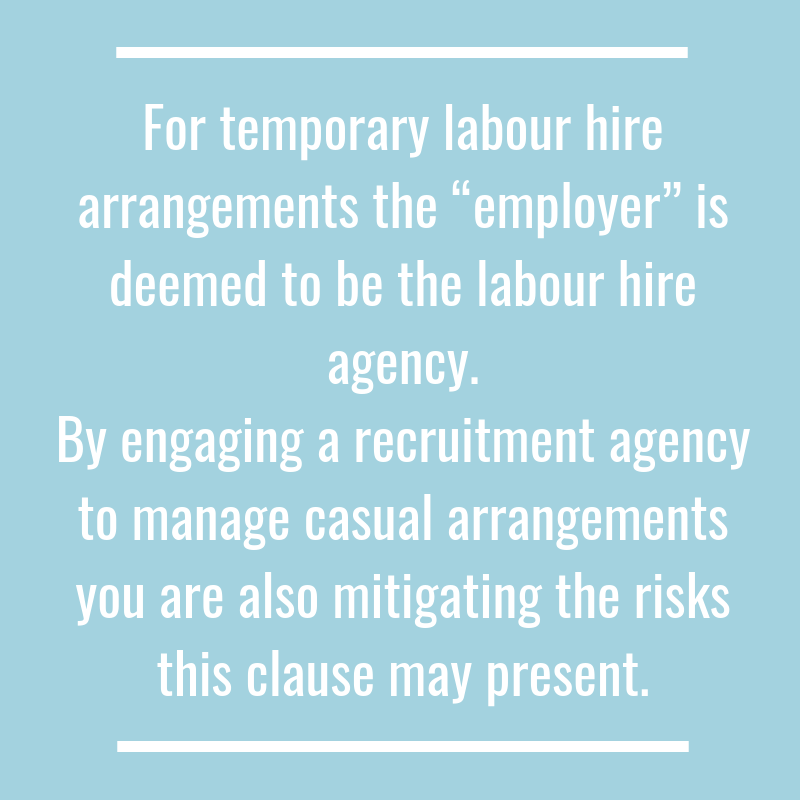Refine results
Casual Conversion 2018
Casual Conversion: 4 points to protect your business

Casuals may request to convert
In August 2018 as part of the Fair Work Commission’s review of Modern Awards, the wording of a casual conversion clause was confirmed. This clause can be found in paragraph 35 of the FWC’s decision.
The clause stipulates that after a regular casual employee has worked a “pattern of hours on an ongoing basis” for 12 months may request – in writing – that their employment be converted to full time or part time employment.
It is important to note that for all temporary labour hire arrangements the “employer” is deemed to be the labour hire agency. As such, by engaging a recruitment agency to manage casual arrangements you are also mitigating the risks this clause presents.
For 85 Modern Awards this is an entirely new concept; only 14 Modern Awards previously contained a casual conversion clause. These 14 have also been amended and clarified to ensure consistency across all awards.
Your rights and obligations as an employer
Though the clause gives casuals grounds for requesting the conversion of their employment, it also provides employers with the conditions for which it may agree to or refuse the request.
Any request may only be refused on reasonable grounds and after there has been consultation with the employee.
So what do you need to know? Firstly, the request must be given in writing, and can only be requested after a pattern of hours on an ongoing basis has been performed in the preceding 12 month period.
Refusal conditions
If an employer refuses a conversion request, it must be able to demonstrate:
- That there has been consultation with the employee
-
That there known facts or reasonably foreseeable grounds to refuse, which may include;
- Hours would need to be adjusted significantly
- Position will cease to exist within 12 months
- Hours of work will be significantly reduced within 12 months
- Change of days/times for which the casual is unavailable
- Reasons must be provided in writing within 21 days
- Decisions may be disputed and escalated to the Fair Work Commission
Acceptance of conversion request
If an employer agrees to a request to convert to full time or part time employment, the discussion must be recorded in writing and include:
- Whether the employment will be full time or part time
- The conversion takes effect from the next pay cycle unless otherwise agreed
Things to consider
The Fair Work Commission makes it clear that employers are largely compelled to accept conversion requests if the employee has been working regular hours.
The employer will need to be able to demonstrate that they have consulted with the employee and that there are known facts or reasonably foreseeable factors to refuse. This could include:
- Planned (documented) changes to the business or workforce that will impact the level of work available
- A low standard of performance and documented performance management processes which may reasonably result in reduction of hours of work offered/available
Regardless of whether you accept or refuse a request, as always it is important to properly document the circumstances to protect the business from future claims.
Notifying your casual workforce
All employers are required to provide existing casual employees with the wording of this clause prior to 1st January 2019, and all new casuals within the first 12 months of their employment.
Engaging your temporary workforce through a compliant labour hire arrangement largely protects your business from the risks this new clause poses to employers. However, as with all legal employment obligations for an outsourced workforce, the potential for your brand to be named in any dispute represents a public relations nightmare. Make sure your temporary workforce has been notified by your preferred recruitment suppliers prior to 1st of January 2019, and that they have processes in place for notifying new casuals of the clause.
Dixon Appointments has notified all existing casuals of this clause in November 2018 and provides new casuals with the clause wording upon interview.
Need more information about your casuals or how your temporary workforce might be impacted? Call your recruiter for further insights
Related Articles
Latest Employment and Market Insights – February 2025
Stay informed and navigate Australia’s evolving employment landscape with our latest recruitment and labour market insights. Unemployment rate rises to…
Dixon Appointments and Talentpath Recruitment Form Bold New Strategic Partnership
Dixon Appointments and Talentpath Recruitment Form Bold New Strategic Partnership Values-based partnership to accelerate growth for both female-led, Australian-owned…

